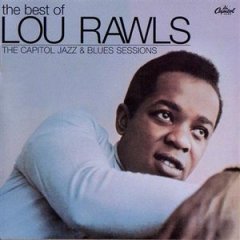Lou Rawls - The Best of, The Capitol Jazz & Blues Sessions (2006)
Lou Rawls - The Best of, The Capitol Jazz & Blues Sessions (2006)

01 Motherless Child
02 God Bless The Child
03 Nobody But Me
04 Blues For The Weepers
05 Goin' To Chicago Blues
06 How Long How Long Blues
07 Southside Blues/Tobacco Road (Medley)
08 Something Stirring In My Soul
09 Georgia On My Mind
10 So Hard To Laugh So Easy To Cry
11 Old Folks
12 Somebody Have Mercy
13 Why (Do I Love You So)
14 Street of Dreams
15 I Wonder
16 Let's Burn Down The Cornfield
17 One For My Baby One More For The Road
18 Mean Old World
19 Long Gone Blues
20 Fine And Mellow
Earl Palmer - drums
Herb Ellis
Lou Rawls - vocals
Jimmy Bond - bass instrument
Richard "Groove" Holmes - organ
Rene Hall - guitar
Pilgrim Travelers - background vocals
Cliff White
Eddie Beal – piano
Many people may remember Lou Rawls as a fundraiser, a pitchman for Budweiser or a silky-smooth '70s soul crooner, but when he signed to Capitol in the early '60s, Rawls was strictly a jazz and blues singer. Sure he tried for hits, and even struck occasionally, with "Love Is a Hurtin' Thing" and "Your Good Thing (Is About to End)," but he was at his best when tackling the material that is collected on The Best of Lou Rawls: The Capitol Jazz & Blues Sessions. A nice mix of jazz standards, blues, pop-gospel and big band swing, the disc showcases Rawls' flexibility, light touch, and his one-of-a-kind voice as he struts and swaggers through the up-tempo tracks like "Nobody but Me," "Street of Dreams," or "Goin' to Chicago Blues," and as he gets down to something real and gritty on the ballads like "Blues for the Weepers," "How Long, How Long Blues," "So Hard to Laugh, So Easy to Cry," and the centerpiece of the album, his medley of "Southside Blues" and "Tobacco Road," which features one of Rawls' patented monologues. With help from producers like Nick Venet and David Axelrod, as well as arrangers like Benny Carter, Benny Golson, and the great H.B. Barnum, Rawls' records have always sounded near-perfect, hearing them in a setting like this only spotlights what a good working environment Rawls could create. The collection isn't perfect; as one could argue about the omission of his 1962 take on "(They Call It) Stormy Monday," or his mellow "Gee Baby, Ain't I Good to You." However, it is one hell of a fine listen that anyone who loves Rawls should add to their collection, especially if you only know him for his post-1970 work [A boon for collectors are the three bonus tracks from a recently unearthed session Rawls cut with the Curtis Amy Sextet that is as close as he came to being a hard bop singer. It is a fascinating find and as the liner notes state, it is truly a shame that there were no more songs recorded by the group.] ---Tim Sendra, allmusic.com
download (mp3 @320 kbs):
yandex mediafire ulozto solidfiles global.files
Last Updated (Tuesday, 13 April 2021 09:53)








